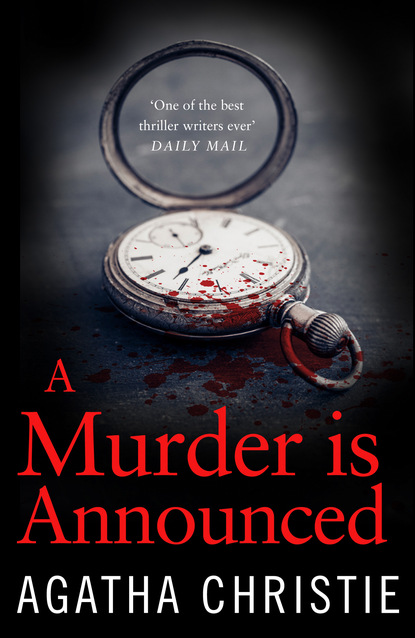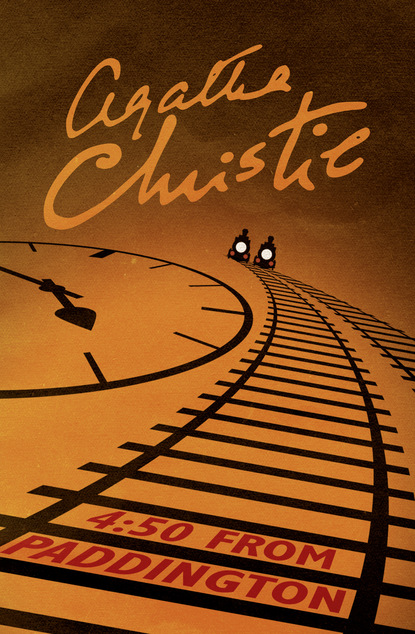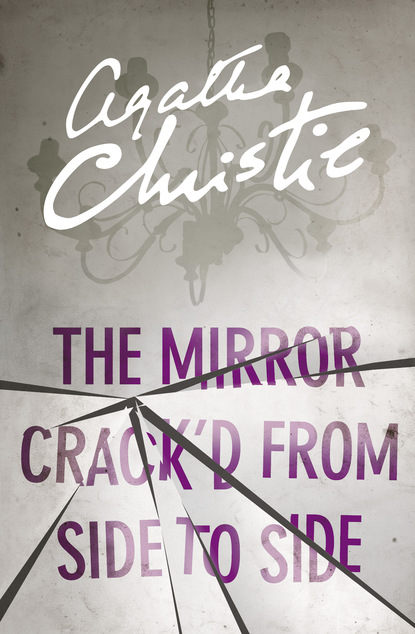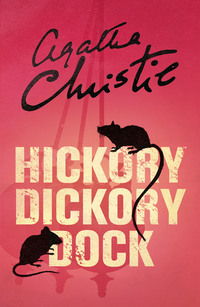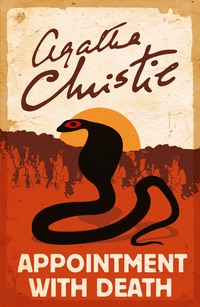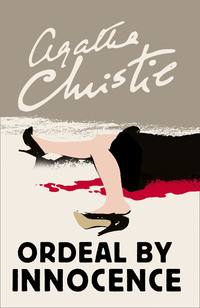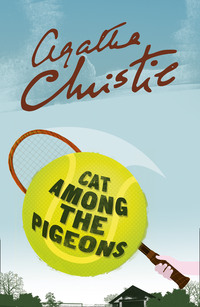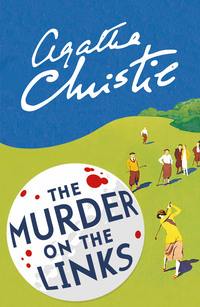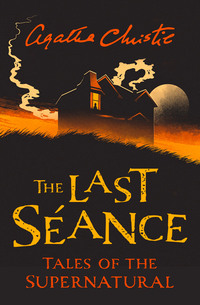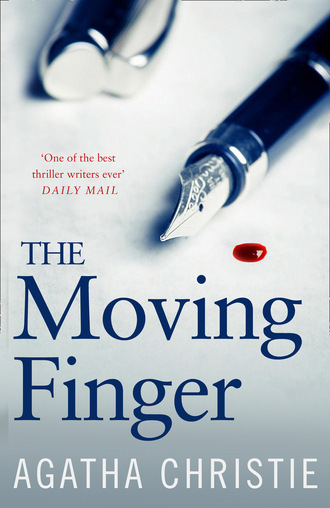
Полная версия
The Moving Finger



Copyright
Published by HarperCollinsPublishers Ltd 1 London Bridge Street London SE1 9GF
www.harpercollins.co.uk
First published in Great Britain by Collins, The Crime Club 1943
The Moving Finger™ is a trade mark of Agatha Christie Limited and Agatha Christie® Marple® and the Agatha Christie Signature are registered trade marks of Agatha Christie Limited in the UK and elsewhere.
Copyright © 1943 Agatha Christie Limited. All rights reserved.
www.agathachristie.com
Cover by Nick Castle © HarperCollins/Agatha Christie Ltd 2016
Agatha Christie asserts the moral right to be identified as the author of this work.
A catalogue copy of this book is available from the British Library.
This novel is entirely a work of fiction. The names, characters and incidents portrayed in it are the work of the author’s imagination. Any resemblance to actual persons, living or dead, events or localities is entirely coincidental.
All rights reserved under International and Pan-American Copyright Conventions. By payment of the required fees, you have been granted the non-exclusive, non-transferable right to access and read the text of this e-book on screen. No part of this text may be reproduced, transmitted, down-loaded, decompiled, reverse engineered, or stored in or introduced into any information storage and retrieval system, in any form or by any means, whether electronic or mechanical, now known or hereinafter invented, without the express written permission of HarperCollins.
Source ISBN: 9780008196547
Ebook Edition © December 2016 ISBN: 9780007422470
Version: 2020-01-28
Dedication
To my Friends Sidney and Mary Smith
Contents
Cover
Title Page
Copyright
Dedication
Chapter 1
Chapter 2
Chapter 3
Chapter 4
Chapter 5
Chapter 6
Chapter 7
Chapter 8
Chapter 9
Chapter 10
Chapter 11
Chapter 12
Chapter 13
Chapter 14
Chapter 15
Keep Reading …
Also by Agatha Christie
About the Publisher
CHAPTER 1
When at last I was taken out of the plaster, and the doctors had pulled me about to their hearts’ content, and nurses had wheedled me into cautiously using my limbs, and I had been nauseated by their practically using baby talk to me, Marcus Kent told me I was to go and live in the country.
‘Good air, quiet life, nothing to do—that’s the prescription for you. That sister of yours will look after you. Eat, sleep and imitate the vegetable kingdom as far as possible.’
I didn’t ask him if I’d ever be able to fly again. There are questions that you don’t ask because you’re afraid of the answers to them. In the same way during the last five months I’d never asked if I was going to be condemned to lie on my back all my life. I was afraid of a bright hypocritical reassurance from Sister. ‘Come now, what a question to ask! We don’t let our patients go talking in that way!’
So I hadn’t asked—and it had been all right. I wasn’t to be a helpless cripple. I could move my legs, stand on them, finally walk a few steps—and if I did feel rather like an adventurous baby learning to toddle, with wobbly knees and cotton wool soles to my feet—well, that was only weakness and disuse and would pass.
Marcus Kent, who is the right kind of doctor, answered what I hadn’t said.
‘You’re going to recover completely,’ he said. ‘We weren’t sure until last Tuesday when you had that final overhaul, but I can tell you so authoritatively now. But—it’s going to be a long business. A long and, if I may so, a wearisome business. When it’s a question of healing nerves and muscles, the brain must help the body. Any impatience, any fretting, will throw you back. And whatever you do, don’t “will yourself to get well quickly”. Anything of that kind and you’ll find yourself back in a nursing home. You’ve got to take life slowly and easily, the tempo is marked Legato. Not only has your body got to recover, but your nerves have been weakened by the necessity of keeping you under drugs for so long.
‘That’s why I say, go down to the country, take a house, get interested in local politics, in local scandal, in village gossip. Take an inquisitive and violent interest in your neighbours. If I may make a suggestion, go to a part of the world where you haven’t got any friends scattered about.’
I nodded. ‘I had already,’ I said, ‘thought of that.’
I could think of nothing more insufferable than members of one’s own gang dropping in full of sympathy and their own affairs.
‘But Jerry, you’re looking marvellous—isn’t he? Absolutely. Darling, I must tell you—What do you think Buster has done now?’
No, none of that for me. Dogs are wise. They crawl away into a quiet corner and lick their wounds and do not rejoin the world until they are whole once more.
So it came about that Joanna and I, sorting wildly through house-agents’ glowing eulogies of properties all over the British Isles, selected Little Furze, Lymstock, as one of the ‘possibles’ to be viewed, mainly because we had never been to Lymstock, and knew no one in that neighbourhood.
And when Joanna saw Little Furze she decided at once that it was just the house we wanted.
It lay about half a mile out of Lymstock on the road leading up to the moors. It was a prim low white house, with a sloping Victorian veranda painted a faded green. It had a pleasant view over a slope of heather-covered land with the church spire of Lymstock down below to the left.
It had belonged to a family of maiden ladies, the Misses Barton, of whom only one was left, the youngest, Miss Emily.
Miss Emily Barton was a charming little old lady who matched her house in an incredible way. In a soft apologetic voice she explained to Joanna that she had never let her house before, indeed would never have thought of doing so, ‘but you see, my dear, things are so different nowadays—taxation, of course, and then my stocks and shares, so safe, as I always imagined, and indeed the bank manager himself recommended some of them, but they seem to be paying nothing at all these days—foreign, of course! And really it makes it all so difficult. One does not (I’m sure you will understand me, my dear, and not take offence, you look so kind) like the idea of letting one’s house to strangers—but something must be done, and really, having seen you, I shall be quite glad to think of you being here—it needs, you know, young life. And I must confess I did shrink from the idea of having Men here!’
At this point, Joanna had to break the news of me. Miss Emily rallied well.
‘Oh dear, I see. How sad! A flying accident? So brave, these young men. Still, your brother will be practically an invalid—’
The thought seemed to soothe the gentle little lady. Presumably I should not be indulging in those grosser masculine activities which Emily Barton feared. She inquired diffidently if I smoked.
‘Like a chimney,’ said Joanna. ‘But then,’ she pointed out, ‘so do I.’
‘Of course, of course. So stupid of me. I’m afraid, you know, I haven’t moved with the times. My sisters were all older than myself, and my dear mother lived to be ninety-seven—just fancy!—and was most particular. Yes, yes, everyone smokes now. The only thing is, there are no ash-trays in the house.’
Joanna said that we would bring lots of ash-trays, and she added with a smile, ‘We won’t put down cigarette ends on your nice furniture, that I do promise you. Nothing makes me so mad myself as to see people do that.’
So it was settled and we took Little Furze for a period of six months, with an option of another three, and Emily Barton explained to Joanna that she herself was going to be very comfortable because she was going into rooms kept by an old parlourmaid, ‘my faithful Florence’, who had married ‘after being with us for fifteen years. Such a nice girl, and her husband is in the building trade. They have a nice house in the High Street and two beautiful rooms on the top floor where I shall be most comfortable, and Florence so pleased to have me.’
So everything seemed to be most satisfactory, and the agreement was signed and in due course Joanna and I arrived and settled in, and Miss Emily Barton’s maid Partridge having consented to remain, we were well looked after with the assistance of a ‘girl’ who came in every morning and who seemed to be half-witted but amiable.
Partridge, a gaunt dour female of middle age, cooked admirably, and though disapproving of late dinner (it having been Miss Emily’s custom to dine lightly off a boiled egg) nevertheless accommodated herself to our ways and went so far as to admit that she could see I needed my strength building up.
When we had settled in and been at Little Furze a week Miss Emily Barton came solemnly and left cards. Her example was followed by Mrs Symmington, the lawyer’s wife, Miss Griffith, the doctor’s sister, Mrs Dane Calthrop, the vicar’s wife, and Mr Pye of Prior’s End.
Joanna was very much impressed.
‘I didn’t know,’ she said in an awestruck voice, ‘that people really called—with cards.’
‘That is because, my child,’ I said, ‘you know nothing about the country.’
‘Nonsense. I’ve stayed away for heaps of week-ends with people.’
‘That is not at all the same thing,’ I said.
I am five years older than Joanna. I can remember as a child the big white shabby untidy house we had with the fields running down to the river. I can remember creeping under the nets of raspberry canes unseen by the gardener, and the smell of white dust in the stable yard and an orange cat crossing it, and the sound of horse hoofs kicking something in the stables.
But when I was seven and Joanna two, we went to live in London with an aunt, and thereafter our Christmas and Easter holidays were spent there with pantomimes and theatres and cinemas and excursions to Kensington Gardens with boats, and later to skating rinks. In August we were taken to an hotel by the seaside somewhere.
Reflecting on this, I said thoughtfully to Joanna, and with a feeling of compunction as I realized what a selfish, self-centred invalid I had become:
‘This is going to be pretty frightful for you, I’m afraid. You’ll miss everything so.’
For Joanna is very pretty and very gay, and she likes dancing and cocktails, and love affairs and rushing about in high-powered cars.
Joanna laughed and said she didn’t mind at all.
‘As a matter of fact, I’m glad to get away from it all. I really was fed up with the whole crowd, and although you won’t be sympathetic, I was really very cut up about Paul. It will take me a long time to get over it.’
I was sceptical over this. Joanna’s love affairs always run the same course. She has a mad infatuation for some completely spineless young man who is a misunderstood genius. She listens to his endless complaints and works like anything to get him recognition. Then, when he is ungrateful, she is deeply wounded and says her heart is broken—until the next gloomy young man comes along, which is usually about three weeks later!
So I did not take Joanna’s broken heart very seriously. But I did see that living in the country was like a new game to my attractive sister.
‘At any rate,’ she said, ‘I look all right, don’t I?’
I studied her critically and was not able to agree.
Joanna was dressed (by Mirotin) for le Sport. That is to say she was wearing a skirt of outrageous and preposterous checks. It was skin-tight, and on her upper half she had a ridiculous little short-sleeved jersey with a Tyrolean effect. She had sheer silk stockings and some irreproachable but brand new brogues.
‘No,’ I said, ‘you’re all wrong. You ought to be wearing a very old tweed skirt, preferably of dirty green or faded brown. You’d wear a nice cashmere jumper matching it, and perhaps a cardigan coat, and you’d have a felt hat and thick stockings and old shoes. Then, and only then, you’d sink into the background of Lymstock High Street, and not stand out as you do at present.’ I added: ‘Your face is all wrong, too.’
‘What’s wrong with that? I’ve got on my Country Tan Make-up No. 2.’
‘Exactly,’ I said. ‘If you lived in Lymstock, you would have on just a little powder to take the shine off your nose, and possibly a soupçon of lipstick—not very well applied—and you would almost certainly be wearing all your eyebrows instead of only a quarter of them.’
Joanna gurgled and seemed much amused.
‘Do you think they’ll think I’m awful?’ she said.
‘No,’ I said. ‘Just queer.’
Joanna had resumed her study of the cards left by our callers. Only the vicar’s wife had been so fortunate, or possibly unfortunate, as to catch Joanna at home.
Joanna murmured:
‘It’s rather like Happy Families, isn’t it? Mrs Legal the lawyer’s wife, Miss Dose the doctor’s daughter, etc.’ She added with enthusiasm: ‘I do think this is a nice place, Jerry! So sweet and funny and old-world. You just can’t think of anything nasty happening here, can you?’
And although I knew what she said was really nonsense, I agreed with her. In a place like Lymstock nothing nasty could happen. It is odd to think that it was just a week later that we got the first letter.
I see that I have begun badly. I have given no description of Lymstock and without understanding what Lymstock is like, it is impossible to understand my story.
To begin with, Lymstock has its roots in the past. Somewhere about the time of the Norman Conquest, Lymstock was a place of importance. That importance was chiefly ecclesiastical. Lymstock had a priory, and it had a long succession of ambitious and powerful priors. Lords and barons in the surrounding countryside made themselves right with Heaven by leaving certain of their lands to the priory. Lymstock Priory waxed rich and important and was a power in the land for many centuries. In due course, however, Henry the Eighth caused it to share the fate of its contemporaries. From then on a castle dominated the town. It was still important. It had rights and privileges and wealth.
And then, somewhere in seventeen hundred and something, the tide of progress swept Lymstock into a backwater. The castle crumbled. Neither railways nor main roads came near Lymstock. It turned into a little provincial market town, unimportant and forgotten, with a sweep of moorland rising behind it, and placid farms and fields ringing it round.
A market was held there once a week, on which day one was apt to encounter cattle in the lanes and roads. It had a small race meeting twice a year which only the most obscure horses attended. It had a charming High Street with dignified houses set flat back, looking slightly incongruous with their ground-floor windows displaying buns or vegetables or fruit. It had a long straggling draper’s shop, a large and portentous iron-monger’s, a pretentious post office, and a row of straggly indeterminate shops, two rival butchers and an International Stores. It had a doctor, a firm of solicitors, Messrs Galbraith, Galbraith and Symmington, a beautiful and unexpectedly large church dating from fourteen hundred and twenty, with some Saxon remains incorporated in it, a new and hideous school, and two pubs.
Such was Lymstock, and urged on by Emily Barton, anybody who was anybody came to call upon us, and in due course Joanna, having bought a pair of gloves and assumed a velvet beret rather the worse for wear, sallied forth to return them.
To us, it was all quite novel and entertaining. We were not there for life. It was, for us, an interlude. I prepared to obey my doctor’s instructions and get interested in my neighbours.
Joanna and I found it all great fun.
I remembered, I suppose, Marcus Kent’s instructions to enjoy the local scandals. I certainly didn’t suspect how these scandals were going to be introduced to my notice.
The odd part of it was that the letter, when it came, amused us more than anything else.
It arrived, I remember, at breakfast. I turned it over, in the idle way one does when time goes slowly and every event must be spun out to its full extent. It was, I saw, a local letter with a typewritten address.
I opened it before the two with London postmarks, since one of them was a bill and the other from a rather tiresome cousin.
Inside, printed words and letters had been cut out and gummed to a sheet of paper. For a minute or two I stared at the words without taking them in. Then I gasped.
Joanna, who was frowning over some bills, looked up.
‘Hallo,’ she said, ‘what is it? You look quite startled.’
The letter, using terms of the coarsest character, expressed the writer’s opinion that Joanna and I were not brother and sister.
‘It’s a particularly foul anonymous letter,’ I said.
I was still suffering from shock. Somehow one didn’t expect that kind of thing in the placid backwater of Lymstock.
Joanna at once displayed lively interest.
‘No? What does it say?’
In novels, I have noticed, anonymous letters of a foul and disgusting character are never shown, if possible, to women. It is implied that women must at all cost be shielded from the shock it might give their delicate nervous systems.
I am sorry to say it never occurred to me not to show the letter to Joanna. I handed it to her at once.
She vindicated my belief in her toughness by displaying no emotion but that of amusement.
‘What an awful bit of dirt! I’ve always heard about anonymous letters, but I’ve never seen one before. Are they always like this?’
‘I can’t tell you,’ I said. ‘It’s my first experience, too.’
Joanna began to giggle.
‘You must have been right about my make-up, Jerry. I suppose they think I just must be an abandoned female!’
‘That,’ I said, ‘coupled with the fact that our father was a tall, dark lantern-jawed man and our mother a fair-haired blue-eyed little creature, and that I take after him and you take after her.’
Joanna nodded thoughtfully.
‘Yes, we’re not a bit alike. Nobody would take us for brother and sister.’
‘Somebody certainly hasn’t,’ I said with feeling.
Joanna said she thought it was frightfully funny.
She dangled the letter thoughtfully by one corner and asked what we were to do with it.
‘The correct procedure, I believe,’ I said, ‘is to drop it into the fire with a sharp exclamation of disgust.’
I suited the action to the word, and Joanna applauded.
‘You did that beautifully,’ she added. ‘You ought to have been on the stage. It’s lucky we still have fires, isn’t it?’
‘The waste-paper basket would have been much less dramatic,’ I agreed. ‘I could, of course, have set light to it with a match and slowly watched it burn—or watched it slowly burn.’
‘Things never burn when you want them to,’ said Joanna. ‘They go out. You’d probably have had to strike match after match.’
She got up and went towards the window. Then, standing there, she turned her head sharply.
‘I wonder,’ she said, ‘who wrote it?’
‘We’re never likely to know,’ I said.
‘No—I suppose not.’ She was silent a moment, and then said: ‘I don’t know when I come to think of it that it is so funny after all. You know, I thought they—they liked us down here.’
‘So they do,’ I said. ‘This is just some half-crazy brain on the borderline.’
‘I suppose so. Ugh—Nasty!’
As she went out into the sunshine I thought to myself as I smoked my after-breakfast cigarette that she was quite right. It was nasty. Someone resented our coming here—someone resented Joanna’s bright young sophisticated beauty—somebody wanted to hurt. To take it with a laugh was perhaps the best way—but deep down it wasn’t funny …
Dr Griffith came that morning. I had fixed up for him to give me a weekly overhaul. I liked Owen Griffith. He was dark, ungainly, with awkward ways of moving and deft, very gentle hands. He had a jerky way of talking and was rather shy.
He reported progress to be encouraging. Then he added:
‘You’re feeling all right, aren’t you. Is it my fancy, or are you a bit under the weather this morning?’
‘Not really,’ I said. ‘A particularly scurrilous anonymous letter arrived with the morning coffee, and it’s left rather a nasty taste in the mouth.’
He dropped his bag on the floor. His thin dark face was excited.
‘Do you mean to say that you’ve had one of them?’
I was interested.
‘They’ve been going about, then?’
‘Yes. For some time.’
‘Oh,’ I said, ‘I see. I was under the impression that our presence as strangers was resented here.’
‘No, no, it’s nothing to do with that. It’s just—’ He paused and then asked, ‘What did it say? At least—’ he turned suddenly red and embarrassed—‘perhaps I oughtn’t to ask?’
‘I’ll tell you with pleasure,’ I said. ‘It just said that the fancy tart I’d brought down with me wasn’t my sister—not ’alf! And that, I may say, is a Bowdlerized version.’
His dark face flushed angrily.
‘How damnable! Your sister didn’t—she’s not upset, I hope?’
‘Joanna,’ I said, ‘looks a little like the angel off the top of the Christmas tree, but she’s eminently modern and quite tough. She found it highly entertaining. Such things haven’t come her way before.’
‘I should hope not, indeed,’ said Griffith warmly.
‘And anyway,’ I said firmly. ‘That’s the best way to take it, I think. As something utterly ridiculous.’
‘Yes,’ said Owen Griffith. ‘Only—’
He stopped, and I chimed in quickly: ‘Quite so,’ I said. ‘Only is the word!’
‘The trouble is,’ he said, ‘that this sort of thing, once it starts, grows.’
‘So I should imagine.’
‘It’s pathological, of course.’
I nodded. ‘Any idea who’s behind it?’ I asked.
‘No, I wish I had. You see, the anonymous letter pest arises from one of two causes. Either it’s particular—directed at one particular person or set of people, that is to say it’s motivated, it’s someone who’s got a definite grudge (or thinks they have) and who chooses a particularly nasty and underhand way of working it off. It’s mean and disgusting but it’s not necessarily crazy, and it’s usually fairly easy to trace the writer—a discharged servant, a jealous woman—and so on. But if it’s general, and not particular, then it’s more serious. The letters are sent indiscriminately and serve the purpose of working off some frustration in the writer’s mind. As I say, it’s definitely pathological. And the craze grows. In the end, of course, you track down the person in question—it’s often someone extremely unlikely, and that’s that. There was a bad outburst of the kind over the other side of the county last year—turned out to be the head of the millinery department in a big draper’s establishment. Quiet, refined woman—had been there for years. I remember something of the same kind in my last practice up north—but that turned out to be purely personal spite. Still, as I say, I’ve seen something of this kind of thing, and, quite frankly, it frightens me!’


